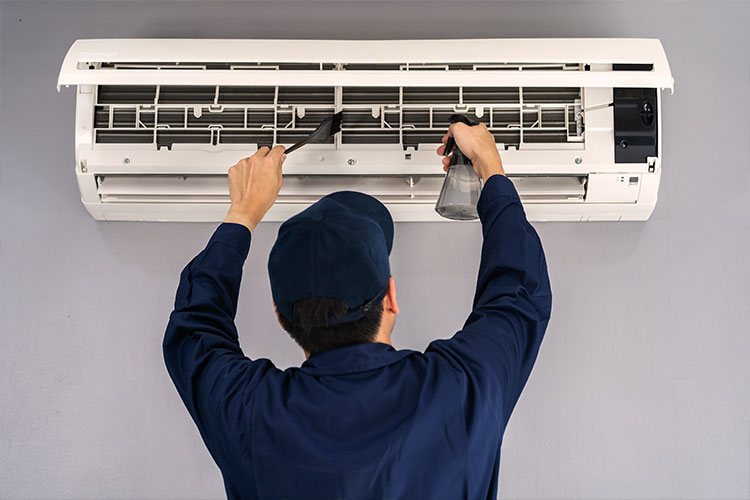Repair Air Conditioner: Professional Cooling System Restoration Ensures Your Home Remains Comfortable Throughout The Hottest Days

Common Air Conditioning Issues
Have you ever felt that abrupt rush of warm air simply when you anticipated a cool breeze? It's discouraging, isn't it? Numerous homeowners face this predicament, often unaware of what hides underneath the surface of their air conditioning system. Let's decipher the secret behind some of the most regular concerns that demand timely cooling repair work.
Why Will Not My Air Conditioner Cool Effectively?
When your a/c system blows lukewarm air instead of a refreshing chill, it's a clear indication something's off. A blocked filter or low refrigerant levels often play the bad guy here. Envision attempting to breathe through a scarf on a hot day-- that's what a filthy filter does to your system. Ever wondered why your energy costs increase when the cooling drops? That's your air conditioning having a hard time more difficult to make up for inefficiencies.
Unusual Noises and What They Mean
Clicking, buzzing, or rattling noises aren't just sounds-- they're cries for click here help. A loose belt or a stopping working motor might be the perpetrators. One property owner stated how a consistent grinding sound turned out to be a damaged compressor, saving them from a complete breakdown by acting quickly.
Common Problems at a Look
| Symptom | Likely Trigger | Quick Repair |
|---|---|---|
| Warm Air | Low refrigerant or filthy filter | Replace filter, check refrigerant levels |
| Water Leaks | Clogged drain line or frozen coils | Clear drain line, thaw coils |
| Unusual Noises | Loose parts or motor issues | Tighten parts, check motor |
Is Your air conditioning Cycling On and Off?
Brief cycling is more than an annoyance; it can significantly decrease your system's life expectancy. This could signify a large unit or a thermostat glitch. Have you observed your system switching on and off like a flickering light? Don't ignore it. It's a subtle tip prompting you to contact the experts before it turns into a pricey disaster.
- Unclean filters and coils trigger air flow problems.
- Thermostat malfunctions result in inconsistent temperatures.
- Electrical problems can stop your AC from beginning.
Vital Tools for A/c Repair Work
Ever stood in front of a vast air conditioning system questioning which tool will open the secret? The right instruments can make all the distinction in between a quick repair and an unlimited afternoon of frustration. For example, a digital manifold gauge set isn't just an elegant gizmo; it's the investigator's magnifying glass in the world of refrigerant pressure. Its accuracy assists identify leakages or imbalances that a casual look might miss out on.
When dealing with stubborn or rusted components, a quality tubing cutter deserves its weight in gold. It slices through copper pipelines easily, preventing damage that might result in pricey leakages. Have you ever tried to bend copper tubing by hand only to end up with kinks? Avoiding this requires specialized flexing tools created to preserve the pipeline's stability.
Tools That Experts Swear By
- Air pump: Necessary for removing moisture and air from the system before recharging refrigerant, ensuring optimum efficiency.
- Leak detector: A must-have for capturing invisible refrigerant leakages that can trigger system inefficiency.
- Multimeter: Beyond measuring voltage, it's important for diagnosing electrical faults within the a/c's control system.
- Fin comb: A small yet magnificent tool that corrects bent condenser fins, boosting air flow and performance.
Pro Tips for Utilizing Cooling Repair Tools
- Always confirm your gauge readings against maker specs; even experienced techs double-check to avoid expensive misdiagnoses.
- When utilizing a vacuum pump, make sure all valves and hoses are airtight; a minor leak can destroy the evacuation procedure.
- Tidy your fin comb frequently. Dust and grime can trigger it to snag, harmful fragile fins further.
In the heat of summer, a malfunctioning compressor or clogged filter can feel like a ticking time bomb. However equipped with the right tools and knowledge, the repair work ends up being less of an ordeal and more of a gratifying puzzle fixed. Isn't it curious how a well-calibrated gauge or a basic leakage detector can transform the whole outcome?
Step-by-Step Repair Process
Ever discovered how your air conditioning unit starts to sputter, hardly whispering the cool breeze it when delivered? The first relocation is a comprehensive diagnosis-- because thinking only wastes time and resources. You might begin by examining the thermostat settings, but in some cases the genuine culprit lurks much deeper.
1. Preliminary Assessment and Diagnostic
Begin by powering off the system to prevent shocks. Open the access panels and visually inspect for charred wires, clogged filters, or ice buildup. A common oversight is neglecting the condenser coils; dust and dirt here can choke performance. Utilize a multimeter to test electrical components and verify if the compressor is getting power.
2. Determining Refrigerant Issues
Does the system blow warm air? That's often a sign of low refrigerant levels or leaks. Specialists use a manifold gauge set to measure pressure precisely. Remember, overcharging or undercharging the system can cause irreparable damage-- exact measurement is crucial.
3. Cleaning Up and Component Replacement
Sometimes, a basic coil cleaning restores the system. Other times, it requires switching out capacitors, contactors, or fan motors. Changing these parts includes careful disassembly and reassembly; avoiding steps can cause more breakdowns.
4. System Testing and Calibration
Once repairs are made, change the system back on and observe its habits. Procedure the temperature level drop throughout the evaporator coil-- it must be roughly 15-20 ° F. If not, recalibrate the thermostat or examine for air flow obstructions.
Specialist Tips
- Prevent running the compressor without refrigerant-- this stress out the motor rapidly.
- Use a UV dye to locate elusive leakages; they're often concealed in hard-to-reach locations.
- Never ever overlook the drain line-- clogs here can cause water damage and system failure.
- Use insulated gloves when dealing with capacitors; they keep charge and can deliver a nasty shock.
Defending Against Sudden Breakdowns
Have you ever wondered why your a/c sputters to a halt right at the peak of summer? The fact is, ignoring routine upkeep often invites unexpected failures. Dust, debris, and damaged components wage a quiet war inside your system. Preventive maintenance is the secret weapon-- catching small concerns before they spiral out of control.
Specialist Tips for Keeping Your Air Conditioner in Top Shape
Heating And Air Conditioning Places Jacksonville FLAir Conditioning Companies Jacksonville FL
Air Conditioning Repair Services Jacksonville FL
Air Conditioning Tune Up Jacksonville FL
Commercial Heating And Air Conditioning Repair Near Me Jacksonville FL
- Clean or replace filters regular monthly: A clogged filter chokes air flow, requiring the system to work overtime and accelerating wear.
- Check coil fins: Bent fins limit air passage, much like a traffic jam in your cooling system. Use a fin comb to align them thoroughly.
- Check refrigerant levels: Low refrigerant can cause the compressor to get too hot, a precursor to pricey repairs.
- Clear the condensate drain: Obstructions here can cause water damage and mold growth, a concealed culprit behind sticking around odors.
- Examine electrical connections: Loose circuitry or rusty terminals frequently stimulate intermittent failures, a subtle indication.

When Was the Last Time You Listened to Your AC?
That faint rattling or uncommon hum may appear insignificant, however it's a precursor to bigger mechanical issues. One summer season, a client discussed a soft buzzing noise. A fast evaluation exposed a loose fan blade-- simple to repair, yet left unattended, it could have shattered the motor. Minutes like these highlight the worth of routine checks.
Quick List for Seasonal Preparation
| Action | Frequency | Why It Matters |
|---|---|---|
| Filter cleaning/replacement | Every 1 month | Maintains airflow and efficiency |
| Coil and fin examination | Two times a year | Avoids airflow limitations |
| Refrigerant level check | Every year | Makes sure proper cooling capacity |
| Drain pipes line cleaning | Every 6 months | Avoids water damage and mold |
| Electrical system assessment | Annually | Prevents sudden shutdowns |
Pro Tip: Beyond the Essentials
Did you know that lightly oiling the fan motor bearings every year can extend their life expectancy? It's an information frequently overlooked but important. Also, shading your outdoor unit from direct sunlight can reduce the compressor's workload, discreetly enhancing longevity. Keep in mind, the health of your ac system is a reflection of the attention you offer it before it shrieks for help.